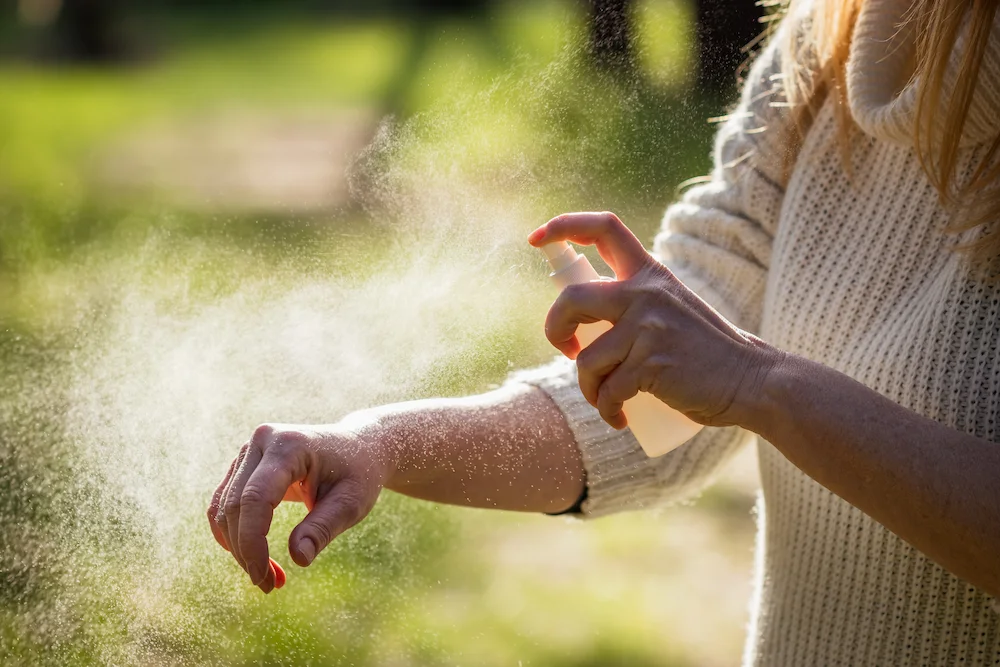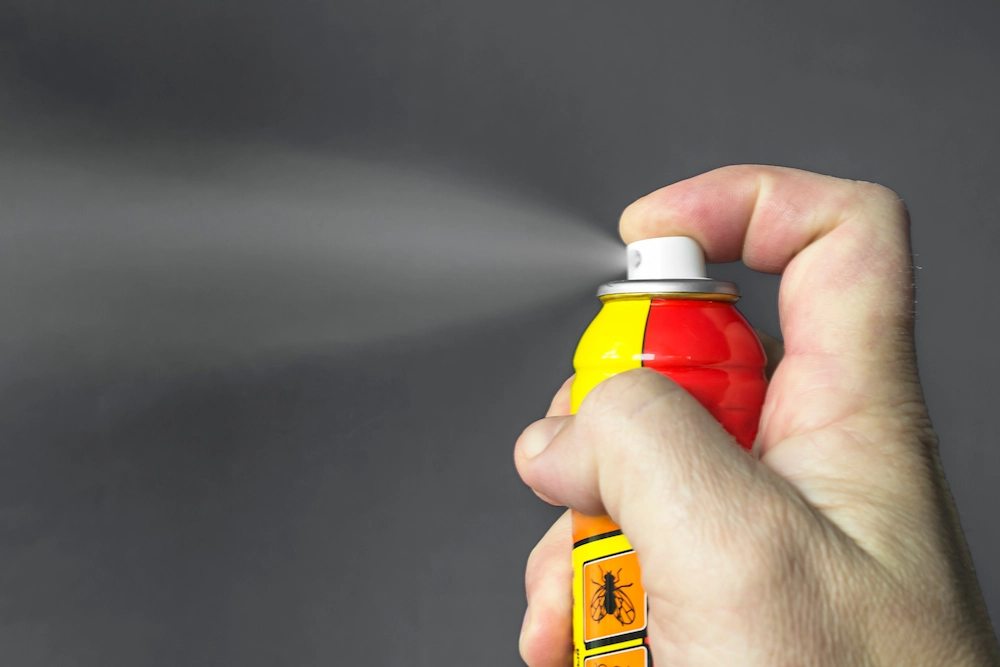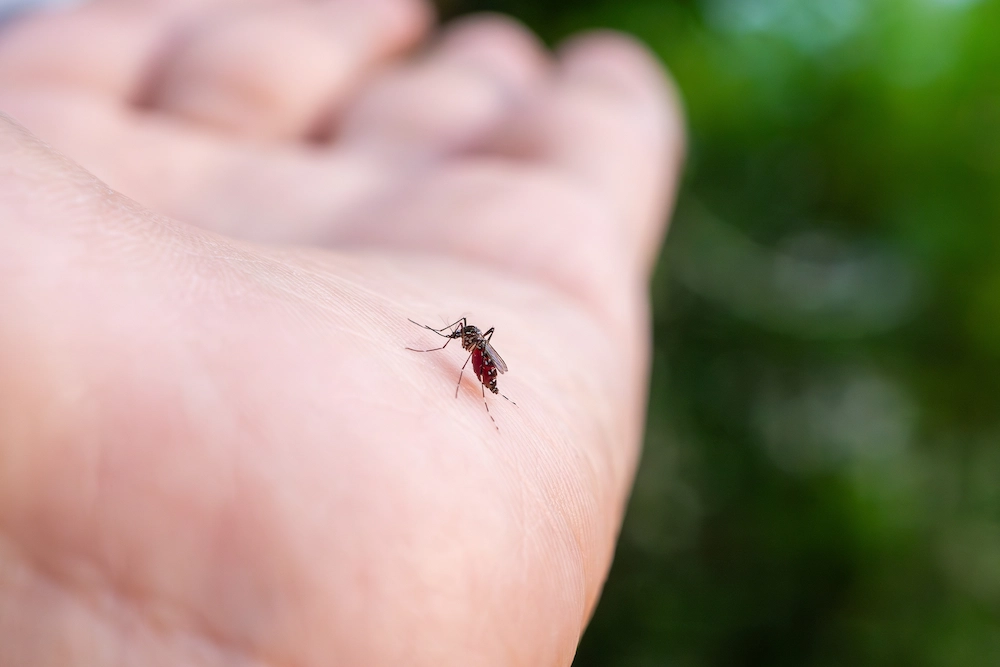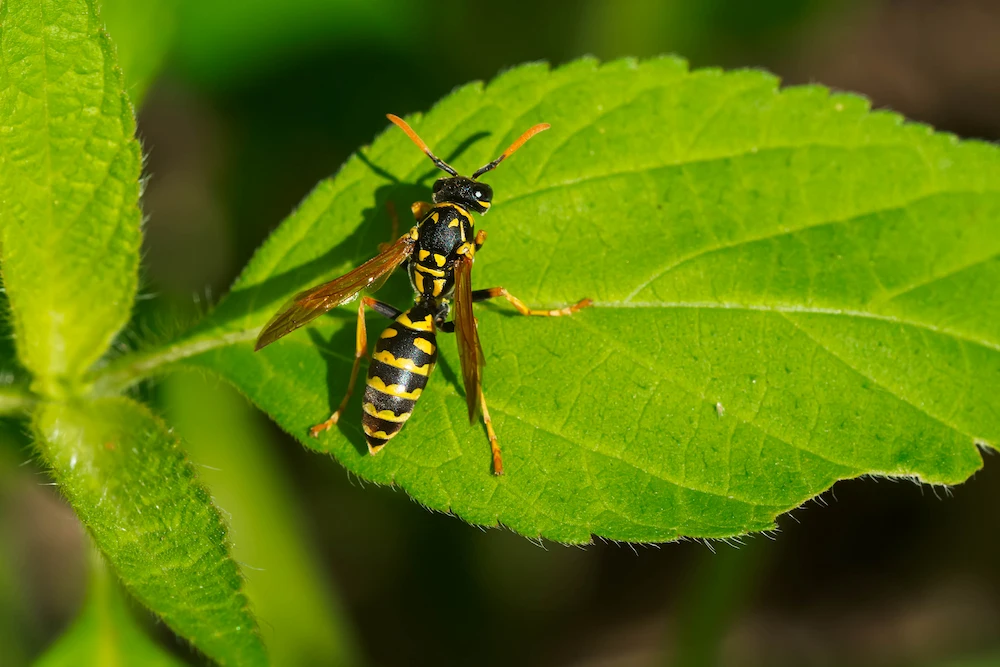What is Bug Spray, Really?
What is Bug Spray, Really?
Summary: Bug spray is a great tool for preventing pests during outdoor activities, but how does it work? This blog gives an accessible explanation of the science behind bug spray and advice on choosing the right repellent. Green Pest Services prevents pests for the long run.
Some of the best outdoor activities, like hiking and fishing, unfortunately come with the price of tiny pests that make it their mission to pester you. This is why insecticides were introduced into the wider consumer market, as bug spray comes in handy on all kinds of adventures.
But what does bug spray even do to combat the hordes of bloodthirsty bugs? Let’s answer this question by diving into the world of bug spray and seeing why it’s effective against certain types of insects.
How Does It Work?

The bug spray that we spritz on our bodies provides an invisible barrier that some insects cannot break through. It won’t necessarily prevent insects from ever landing on us, but it does make it tougher for insects to function normally. There are two categories of “bug spray” that are available for general purchase: insecticides and repellents.
Insecticides are more aggressive towards pests by either killing them or keeping them from reproducing. They can also interrupt the general life cycle of targeted pests.
Repellents simply make us less obvious or attractive to biting pests. This is what happens when we apply bug spray before heading out into nature.
When we talk about bug spray in this blog, we’re referring to the insect repellents that we spray on our bodies.
What Do All Those Labels Mean?

When dealing with chemicals of any kind, it’s important to know what’s being used. This is why reading the labels of both insecticides and repellents is crucial.
If you look at some of the bug sprays you already have at home, you may see a small sticker talking about the EPA. This is the U.S. Environmental Protection Agency, who researches and evaluates all kinds of products and procedures to ensure that human health is valued.
Bug sprays that are assessed by the EPA fall into two categories, provided they pass the tests:
- EPA-registered — It was successfully evaluated for both safety and effectiveness. This is the primary category you want to see when selecting a bug spray.
- EPA-Approved — It’s considered safe, but maybe not the most effective. This is not to say that EPA-approved sprays aren’t effective. It just wasn’t the primary concern of the analysis.
Each insect repellent typically has one main active ingredient. DEET, oil of lemon eucalyptus, and picaridin are the most popular in retail products. A bug spray with a higher percentage of the active ingredient should be protective for a longer period of time. The common range is 15-40%, but sprays with DEET can have anywhere from 5-99%.
People who want to stay away from DEET gravitate towards the insect repellents with oil of lemon eucalyptus or picaridin. But the bad reputation that DEET has gained over the years may be unprecedented…
What is DEET?

DEET is the most common active ingredient in insect repellents, likely due to its high success rate in actually keeping bugs from biting us. DEET is also known as N,N-Diethyl-meta-toluamide or diethyltoluamide. This concoction affects the scent receptors of insects (mostly mosquitoes) and prevents them from smelling both us and the carbon dioxide we produce.
DEET can also block the receptors on the antennae of insects, rendering them blind to us. This doesn’t mean that insects will never fly around or land on us. It just means that they probably won’t bite when they do come near us.
On average, DEET repels ticks for about 2 to 10 hours and mosquitoes for about 2 to 12 hours. The percentage of DEET in the spray affects the length of time that it’s effective, so you’ll need to reapply if it’s a lower percentage and you’re outside all day.
Is DEET Effective?

DEET is essential for insect repellents because it prevents bites from bloodsucking insects. More importantly, it also prevents mosquito and tick diseases. These are the most dangerous risks of their bites, and bug sprays can prevent them from happening in the first place.
Ticks are known for potentially carrying Lyme disease, while mosquitoes transmit pathogens linked to malaria, West Nile virus, and Zika virus. Not every tick and mosquito is infected, but it’s better to be safe than sorry when it comes to harmful diseases.
Speaking of safety, DEET is deemed safe for children by the EPA and CDC. This is assuming that the bug spray is used correctly and kept away from the child’s mouth and eyes. DEET is said to be safe for children about three months of age and older, but it’s your decision whether you want to use insect repellent on your very young child.
You may have been told to avoid DEET due to its unsafe nature, but this is an outdated issue. DEET was known as a dangerous chemical in its early days. It was first developed by the Army in 1946 for their own pest issues, registered for the public in 1957, and then reevaluated in both 1998 and 2014.
Its bad reputation could stem from DEET being confused with DDT, another insecticide component that was banned in the 1970s for actually causing health issues. As for DEET, it’s a mixture you want in your insect repellent.
Are Any Bugs Invincible?

This question is tough to answer since there are so many insect repellents on the market today. What works against one species of pest may not work against another, and some varieties of spray don’t work very well at all.
In general, insect repellents work against ticks, mosquitoes, flies, and biting gnats. Bug sprays with DEET are typically the most effective against these pests. The repellents that are DEET-free and feature essential oils are more effective against the non-biting pests. These sprays have to be reapplied more frequently in order for the plant oils to be effective.
The main caveat with most insect repellents is that they don’t work against stinging pests. Since these insects only sting when their nest or colony is disturbed, it wouldn’t matter if we wore bug spray or not. As long as you don’t touch their nest, you shouldn’t have to worry about a swarm of angry stinging pests.
When it comes to reapplication, we have two suggestions:
- Reapply your bug spray more frequently if the percentage on the label is lower, no matter which active ingredient you are using.
- Reapply bug spray if you’re spending most of the day outside, like you would with sunscreen.
On that note, we recommend staying away from the products that combine DEET with sunscreen as a weird two-for-one. Bug spray and sunscreen have distinct instructions and purposes for a reason, so combining them lowers the effectiveness of both.
When Do You Use It?

Bug spray is necessary when you’re spending a lot amount of time outdoors, especially in rural areas. It’s most needed when you’re participating in outdoor activities, such as camping, fishing, hiking, and boating.
Insect repellent should only be applied outdoors since spraying chemicals in an unventilated area is risky. As we said earlier, it’s important to read all of the instructions on the bottle before applying. You don’t want to find out the hard way that you sprayed way too much or didn’t apply it to the correct spots.
No matter what brand of bug spray you use, there are some general safety tips to keep in mind:
- Only apply the spray to exposed skin, but not on any cuts, open wounds, or burns. Cover these with bandages if you haven’t already.
- Avoid spraying your face when you’re applying the spray to your neck and chest. Don’t open your mouth during the application process.
- Use special care on the areas that are often overlooked, like the small gap between the top of the sock and the bottom of the pants leg.
- Be extra careful when applying bug spray to a child, and don’t spray it directly on their hands or faces.
- Change your clothes and shower immediately after returning from an outdoor adventure. Sleeping in a bed with bug spray on your skin doesn’t sound appealing at all!
If you or anyone in your party develops a reaction to the spray, seek medical attention immediately. It’s rare, but some people get a rash or skin issue after using bug spray. Make sure to tell the doctor exactly which spray it is, so they can pinpoint the cause and give you the most relevant treatments.
Green Keeps the Bugs Away!
Bug spray is great for enjoying life outdoors, but it’s not very effective against infestations. Even some of the store-bought solutions won’t solve infestations since they just eliminate the visible pests. Think of it like putting a bandage on the situation. If you spray a couple of roaches with a strong pesticide, it won’t eliminate the entire roach family living in the shadows.
That’s why Green Pest Services is here! We know all of the hiding spots and lifecycles of the most common pests. Between our thorough inspections and our effective treatments, we will get to the bottom of your pest issues as efficiently as possible. Contact us to learn how we can keep your home pest-free, no can of insect repellent required!
Citations
7 myths and facts about DEET. (n.d.). Off. Retrieved July 16, 2025, from https://off.com/en/education/active-ingredients/7-myths-and-facts-about-deet
Brindle, B. (n.d.). How bug spray works. How Stuff Works. Available at https://home.howstuffworks.com/home-improvement/household-hints-tips/insect-control/bug-spray.htm (Accessed on July 16, 2025).
DEET. (2022, September 7). U.S. Environmental Protection Agency. Retrieved July 16, 2025, from https://www.epa.gov/insect-repellents/deet
Heid, M. (2018, July 25). DEET is the most effective bug spray. But is it safe?. Time. Available at https://time.com/5347546/is-deet-safe/ (Accessed on July 16, 2025).
Jernigan, M. (2022, October 20). How does bug spray affect insects?. SF Gate. Available at https://homeguides.sfgate.com/bug-spray-affect-insects-81756.html (Accessed on July 16, 2025).
M, M. (2020, December 24). Do it yourself pest control: How to choose bug spray. Lowes. Available at https://www.lowes.com/n/buying-guide/how-to-choose-bug-spray (Accessed on July 16, 2025).
Robinson, J. (Dr.). (2020, October 25). How to use bug spray. Web MD. Available at https://www.webmd.com/allergies/using-bug-spray (Accessed on July 16, 2025).
Odor is an Early Sign of Rodents, Here’s Why
Odor is an Early Sign of Rodents, Here’s Why Odor is an Early Sign of Rodents, Here’s Why Summary: Rodent odors are often [...]
Pest Prevention Tips for Snowy Days
Pest Prevention Tips for Snowy Days Pest Prevention Tips for Snowy Days Summary: Snowy weather pushes pests to seek warmth and shelter indoors, [...]
How Do Ants Spend Winter? What Homeowners Should Know About Ants in Winter
How Do Ants Spend Winter? What Homeowners Should Know About Ants in Winter How Do Ants Spend Winter? What Homeowners Should Know About Ants in [...]
Termites Are Awful Winter Pests – Here’s Why
Termites Are Awful Winter Pests – Here’s Why Termites Are Awful Winter Pests – Here’s Why Summary: Termites can remain active through winter [...]
How to Maintain a Pest-Free Kitchen for the Holidays
How to Maintain a Pest-Free Kitchen for the Holidays How to Maintain a Pest-Free Kitchen for the Holidays Summary: This blog educates homeowners [...]
Pests That Invade Packages & Boxes: How to Prevent Hidden Infestations
Pests That Invade Packages & Boxes: How to Prevent Hidden Infestations Pests That Invade Packages & Boxes: How to Prevent Hidden Infestations Summary: [...]

